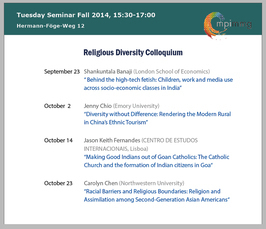"Making Good Indians out of Goan Catholics: The Catholic Church and the formation of Indian citizens in Goa"
Religious Diversity Colloquium Winter 2014/15
- Date: Oct 14, 2014
- Time: 03:30 PM - 05:00 PM (Local Time Germany)
- Speaker: Jason Keith Fernandes (Centro de Estudos Internacionais, Lisboa)
- Jason Keith Fernandes is currently a post-doctoral researcher at the Centre for International Studies (CIE) at ISCTE-IUL, Lisbon. Subsequent to a degree in law and a Master’s degree in the sociology of law, Jason was recently awarded a doctorate in anthropology for a dissertation on The Citizenship Experiences of Goan Catholics. With a Fellowship from the New India Foundation, he is in the process of writing a book manuscript around language and politics in post-colonial Goa.
- Location: MPI-MMG, Hermann-Föge-Weg 12, Göttingen
- Room: Conference Room

For more details please contact vdvoffice(at)mmg.mpg.de.
For Catholics in Goa the 1960s were a critical period as it saw not just the changes wrought by the Vatican Council II, but also because this was the period when Goa was actively being integrated into the Indian Union subsequent to the Indian action in 1961. While a certain kind of Iberian Catholicism and Luso-Indian was acceptable, even if contested, subsequent to the 60s these identities were definitely unwelcome subsequent to integration of this former Portuguese territory within the Indian Union. Hybrid identities were problematic; people were required to be authentic citizens of their nation-states. Using insights from the lives of a couple of Goan priests and the history of the Catholic Church in Goa the paper points to the manner in which various actors in the Catholic Church sought to mould the subjectivities of Goan Catholics to convert persons who were seen as not Indian enough, into “proper” Indians.
This paper seeks to intervene into the realm of citizenship theory to demonstrate that citizenship should be more broadly construed to be understood as political subjectivity. Citizenship, this paper argues, results not merely from interactions between individuals and the state, or even communities and the state, but as a result of a variety of interventions in the socio-political. Not least among these is that of religion. Further, the paper also demonstrates the manner in which international politics contributes to determining citizenship experience within states. In this particular case the paper highlights the manner in which the intersection of the politics within the Catholic Church and colonialism and decolonization contributed to marking the citizenship experience of Catholics in Goa.
In addition to the interventions into the field of citizenship theory, the paper also suggests that these developments in Goa are important to understand the world(s) of Catholicism itself, given that Goa offers us a space between empires, the Portuguese and the British, from which to view the changes within Catholicism subsequent to the Vatican Council and the impact that these changes in Catholicism have had not merely in terms of religious practice but also local, national and international politics.